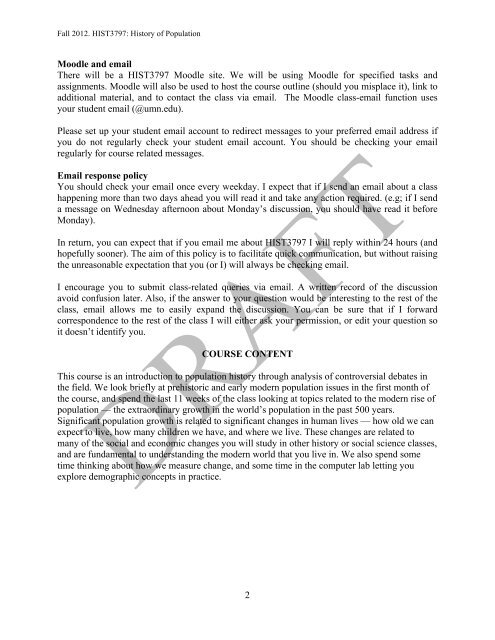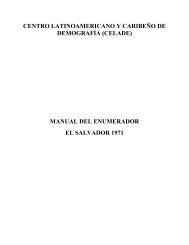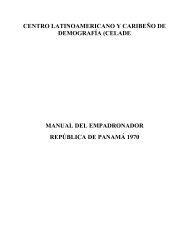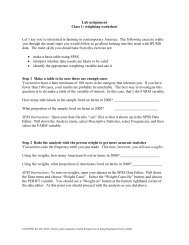1 University of Minnesota History Department HIST3797 ... - Users
1 University of Minnesota History Department HIST3797 ... - Users
1 University of Minnesota History Department HIST3797 ... - Users
You also want an ePaper? Increase the reach of your titles
YUMPU automatically turns print PDFs into web optimized ePapers that Google loves.
Fall 2012. <strong>HIST3797</strong>: <strong>History</strong> <strong>of</strong> Population<br />
Moodle and email<br />
There will be a <strong>HIST3797</strong> Moodle site. We will be using Moodle for specified tasks and<br />
assignments. Moodle will also be used to host the course outline (should you misplace it), link to<br />
additional material, and to contact the class via email. The Moodle class-email function uses<br />
your student email (@umn.edu).<br />
Please set up your student email account to redirect messages to your preferred email address if<br />
you do not regularly check your student email account. You should be checking your email<br />
regularly for course related messages.<br />
Email response policy<br />
You should check your email once every weekday. I expect that if I send an email about a class<br />
happening more than two days ahead you will read it and take any action required. (e.g; if I send<br />
a message on Wednesday afternoon about Monday’s discussion, you should have read it before<br />
Monday).<br />
In return, you can expect that if you email me about <strong>HIST3797</strong> I will reply within 24 hours (and<br />
hopefully sooner). The aim <strong>of</strong> this policy is to facilitate quick communication, but without raising<br />
the unreasonable expectation that you (or I) will always be checking email.<br />
I encourage you to submit class-related queries via email. A written record <strong>of</strong> the discussion<br />
avoid confusion later. Also, if the answer to your question would be interesting to the rest <strong>of</strong> the<br />
class, email allows me to easily expand the discussion. You can be sure that if I forward<br />
correspondence to the rest <strong>of</strong> the class I will either ask your permission, or edit your question so<br />
it doesn’t identify you.<br />
COURSE CONTENT<br />
This course is an introduction to population history through analysis <strong>of</strong> controversial debates in<br />
the field. We look briefly at prehistoric and early modern population issues in the first month <strong>of</strong><br />
the course, and spend the last 11 weeks <strong>of</strong> the class looking at topics related to the modern rise <strong>of</strong><br />
population — the extraordinary growth in the world’s population in the past 500 years.<br />
Significant population growth is related to significant changes in human lives — how old we can<br />
expect to live, how many children we have, and where we live. These changes are related to<br />
many <strong>of</strong> the social and economic changes you will study in other history or social science classes,<br />
and are fundamental to understanding the modern world that you live in. We also spend some<br />
time thinking about how we measure change, and some time in the computer lab letting you<br />
explore demographic concepts in practice.<br />
2





